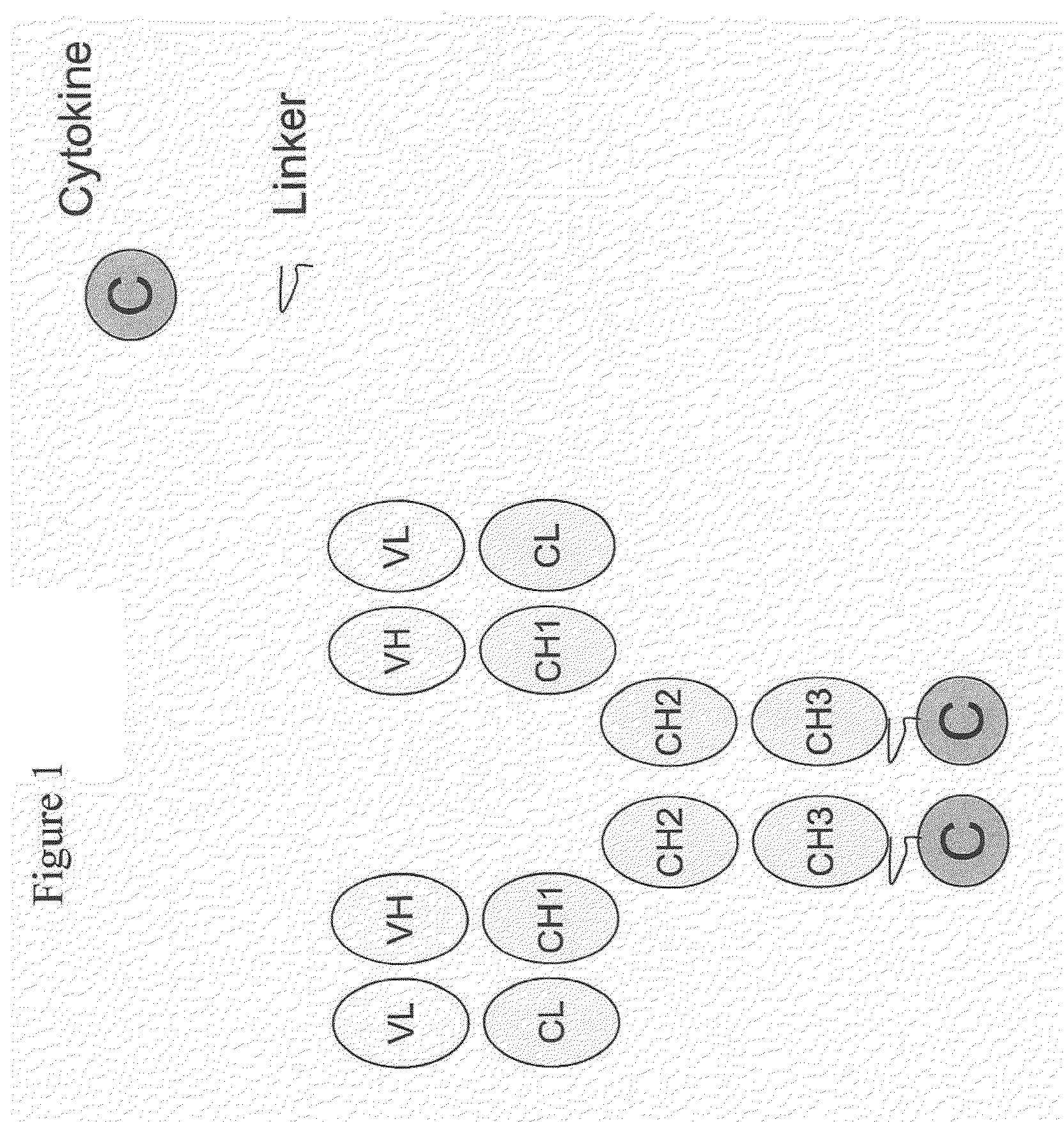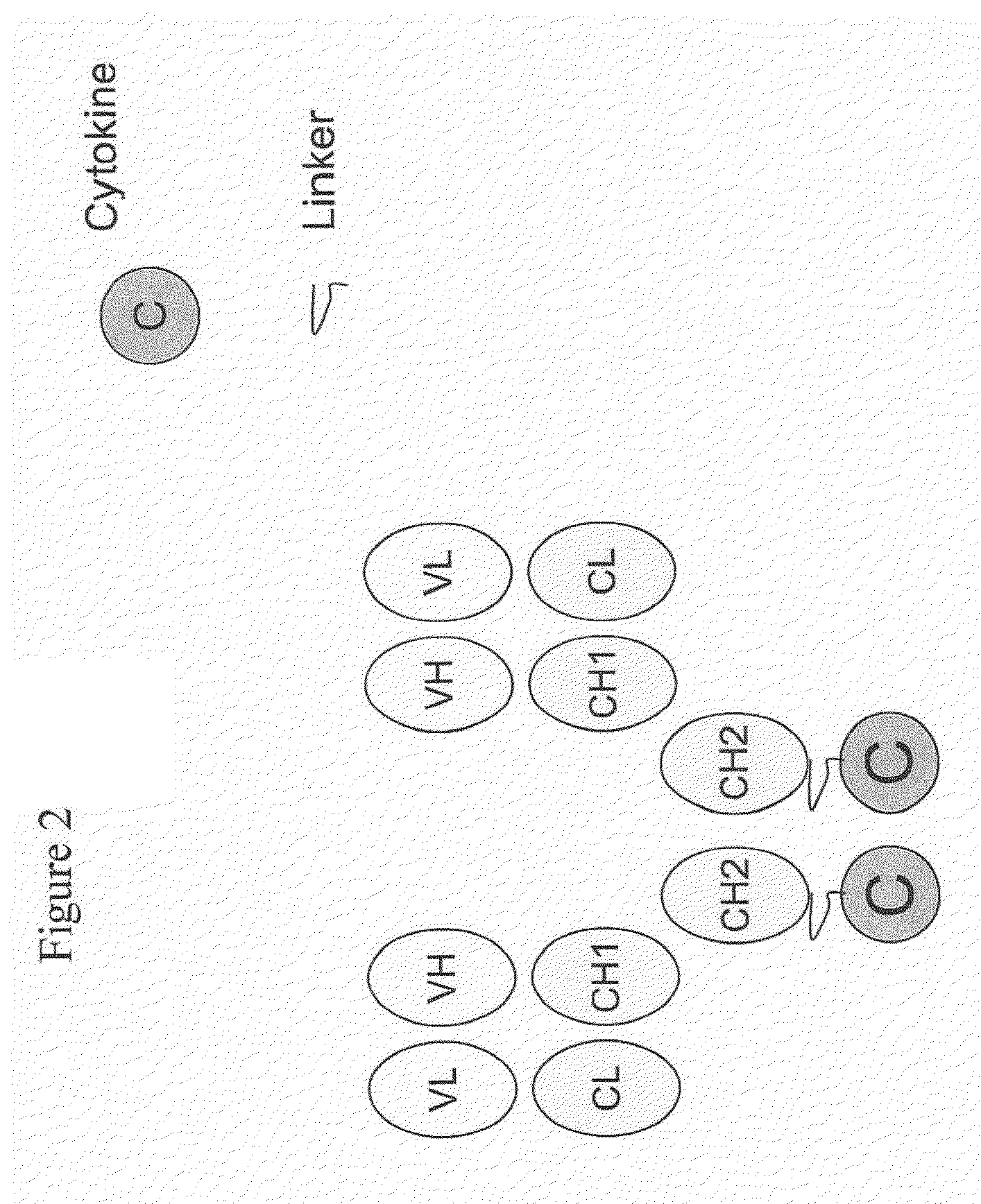Engineered antibody-interferon mutant fusion molecules
a technology of interferon and fusion molecules, applied in the direction of fusions for specific cell targeting, antibody medical ingredients, peptide/protein ingredients, etc., can solve the problems of short half-life of ifn-′ and difficulty in achieving effective ifn- concentrations at malignant disease sites without causing systemic toxicity
- Summary
- Abstract
- Description
- Claims
- Application Information
AI Technical Summary
Benefits of technology
Problems solved by technology
Method used
Image
Examples
example 1
[0109]This example describes the preparation of genetically engineered fusion molecules comprising a tumor associated antigen antibody and an IFN-α mutant molecule (or wildtype IFN-α molecule).
[0110]The fusion molecules of the present invention were prepared using methods and techniques well known and understood by one of ordinary skill in the art and can be generally described as follows: the heavy chain of the antibody was recombinantly engineered with an IFN-α molecule at the carboxy-terminus using a peptide linker, e.g., SGGGGS (SEQ ID NO: 14) or AEAAAKEAAAKAGS (SEQ ID NO: 15). After verifying that the fusion protein vector has the correct nucleotide sequence, it was transfected, along with the antibody light chain vector into CHO cells. Transfectants were screened by ELISA for the production of the complete fusion molecule. The clone giving the highest signal was expanded and following sub-cloning was grown in roller bottles. Conditioned medium was collected, concentrated, and ...
example 2
[0112]This example describes the testing of the anti-CD20Ab-IFN-α mutant fusion molecules of Example 1 at varying doses in various in vitro functional assays to identify anti-CD20Ab-IFN-α mutant fusion molecules with the best therapeutic index. The assays described below are used in the analysis of the anti-CD20Ab-IFN-α mutant fusion molecules.
[0113]A. Evaluation of the Ability of the Fusion Molecules to Bind the IFN-αR Complex
[0114]Various cell lines and methods previously described in the art will be used to determine the best methodology for assessing the binding of the fusion molecules to the IFN-αR complex. Such methods may include Alexa fluor 555 (Invitrogen), Qdot 565 (Invitrogen), or primary / secondary Ab FACS methodology (Invitrogen). Cells lines to be used may include Daudi cells, U266 cells, and Hel 92.1.7 cells.
[0115]Daudi cells are B lymphoblast cells and are very sensitive to the inhibitory effect of IFN-α on cell proliferation. CD20 expression in this cell line is very...
example 3
[0141]This example describes in vivo studies using Ab-IFN-α mutant fusion molecules which demonstrated increased binding affinity for the FcRn receptor in the in vitro assays to determine whether such Ab-IFN-α mutant fusion molecules demonstrate improved PK properties. The assay described below is used in the analysis of the Ab-IFN-α mutant fusion molecules.
[0142]Murine rIFN-α (PBL Biomedical Laboratories), IgG3-IFN-α, and anti-CD20Ab-IFN-α mutant fusion proteins were iodinated to 10 μCi / μg with 125I using Iodo-Beads (Pierce) according to the manufacturer's protocol. Mice were injected i.p. with 66 μCi of 125I-labeled proteins. At various intervals after injection of 125I-labeled rIFN-α, IgG3-IFN-α, or anti-CD20Ab-IFN-α mutant fusion protein residual radioactivity was measured using a mouse whole body counter (Wm. B. Johnson and Associates).
PUM
| Property | Measurement | Unit |
|---|---|---|
| Composition | aaaaa | aaaaa |
Abstract
Description
Claims
Application Information
 Login to View More
Login to View More - R&D
- Intellectual Property
- Life Sciences
- Materials
- Tech Scout
- Unparalleled Data Quality
- Higher Quality Content
- 60% Fewer Hallucinations
Browse by: Latest US Patents, China's latest patents, Technical Efficacy Thesaurus, Application Domain, Technology Topic, Popular Technical Reports.
© 2025 PatSnap. All rights reserved.Legal|Privacy policy|Modern Slavery Act Transparency Statement|Sitemap|About US| Contact US: help@patsnap.com



